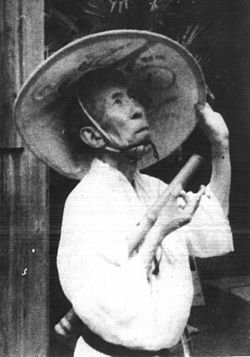Jun Tsuji
| Tsuji Jun Mizushima Ryūkitsu |
|
|---|---|
 |
|
| Born |
October 4, 1884 Tōkyō, Japan |
| Died | November 24, 1944 (aged 60) Tōkyō, Japan |
| Cause of death | Starvation |
| Era | 20th century philosophy |
| School | Nihilism, Egoist anarchism, Individualist anarchism, Lifestylism, Dada |
|
Main interests
|
Stirnerism, Epicureanism, vagabondage, Shakuhachi as Dada, Japanese Buddhism |
|
Notable ideas
|
Dada as the Creative Nothing, the Unmensch |
|
Influences
|
|
|
Influenced
|
|
Jun Tsuji, later Ryūkitsu Mizushima ( Tsuji Jun?, October 4, 1884 – November 24, 1944) was a Japanese author: a poet, essayist, playwright, and translator. He has also been described as a Dadaist, nihilist, Epicurean, shakuhachi musician, actor, feminist, and bohemian. He translated Max Stirner's The Ego and Its Own and Cesare Lombroso's The Man of Genius into Japanese.
Tōkyō-born Tsuji Jun sought escape in literature from a childhood he described as "nothing but destitution, hardship, and a series of traumatizing difficulties". He became interested in Tolstoyan Humanism, Kōtoku Shūsui's socialist anarchism, and the literature of Oscar Wilde and Voltaire, among many others. Later, in 1920 Tsuji was introduced to Dada and became a self-proclaimed first Dadaist of Japan, a title also claimed by Tsuji's contemporary, Takahashi Shinkichi (). Tsuji became a fervent proponent of Stirnerite egoist anarchism, which would become a point of contention between himself and Takahashi. He wrote one of the prologues for famed feminist poet Hayashi Fumiko's 1929 (I Saw a Pale Horse (蒼馬を見たり Ao Uma wo Mitari?) and was active in the radical artistic circles of his time.
...
Wikipedia
